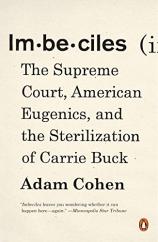Imbeciles: The Supreme Court, American Eugenics, and the Sterilization of Carrie Buck
Review
Imbeciles: The Supreme Court, American Eugenics, and the Sterilization of Carrie Buck
It was not America’s proudest moment, but the facts, as carefully set forth by author and senior writer for Time magazine Adam Cohen, are dolefully undeniable. One influential segment of the population was as set on ridding the nation of undesirables as were the Nazis, who used the tenets of our eugenics movement to bolster their plans to exterminate their own “mongrel races.”
At the center of the case that went to the Supreme Court in 1927 was a young woman, Carrie Buck, a victim of rape while in foster care and working as a servant for her adoptive family. Carrie’s birth mother already had been institutionalized in a “colony” in the state of Virginia on the grounds that she was poor and possibly prostituting herself to feed her children. The correct remedy for Carrie, who, it was reasoned, must be feeble-minded because she had gotten herself in an unacceptable situation, was sterilization (salpingectomy). The murky rationale for using her plight as a test case for involuntary sterilization was that she and her mother were imbeciles (a scientific term at the time). And the state unhesitatingly asserted that her infant daughter certainly must be mentally inferior as well. Those three generations constituted an obvious danger to society.
"Cohen paints a disturbing picture of the widespread American eugenics movement, led by well-placed citizens who were concerned that the country was slipping into disorder through the incursion of immigrants who were ignorant, alcoholic, tubercular, swarthy and short."
The law permitting sterilization of the unfit (poor, deformed, moronic, epileptic) was seen as no different from laws allowing a state to vaccinate people against smallpox. When the case, Buck vs. Bell, went to the Supreme Court, Justice Oliver Wendell Holmes grandly opined that government, which called on “the best citizens for their lives,” also should be able to “call upon those who already sap the strength of the State for these lesser sacrifices.” The approval for sterilizing Carrie Buck passed the Supreme Court with only one dissension, from a Catholic justice. Dr. Bell, who had examined Carrie when she arrived at the colony, was the surgeon who would later perform her sterilization.
Cohen paints a disturbing picture of the widespread American eugenics movement, led by well-placed citizens who were concerned that the country was slipping into disorder through the incursion of immigrants who were ignorant, alcoholic, tubercular, swarthy and short. We were losing our best stock, the northern European white races. Eugenicists touted the benefits of sterilization and isolation of inferior types, using the newly devised Binet-Simon intelligence test as a means of identifying “mongrels.” Distinguished scientists offered support to the American Breeders Association, which concentrated its efforts not on cattle, but on harlots, immigrants and paupers.
Carrie Buck lived a long life, and her letters to family members show not only caring and concern, but “what the Supreme Court had refused to see: a quiet intelligence.” For those who believe such things can’t happen here, or never did, IMBECILES makes salutary reading, and perhaps may generate renewed respect for such modern inconveniences as privacy rights, child protection and the right of women to bear children.
Reviewed by Barbara Bamberger Scott on March 3, 2016
Imbeciles: The Supreme Court, American Eugenics, and the Sterilization of Carrie Buck
- Publication Date: March 7, 2017
- Genres: History, Nonfiction
- Paperback: 416 pages
- Publisher: Penguin Books
- ISBN-10: 0143109995
- ISBN-13: 9780143109990




